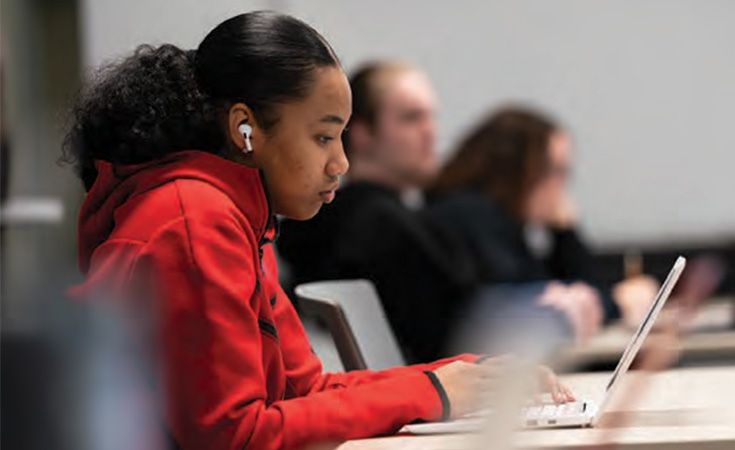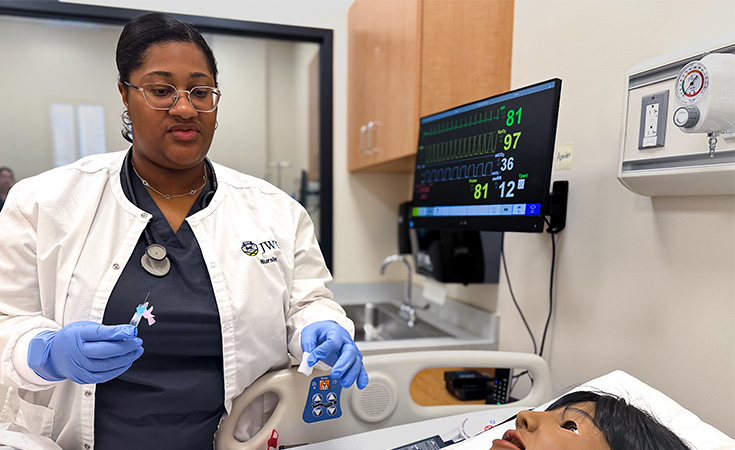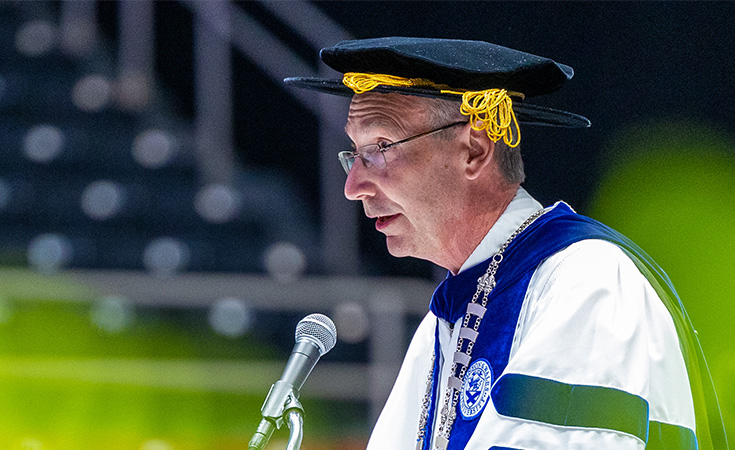They say it takes a village — but a larger community made JWU’s Charlotte Campus a reality.
Convinced that a Charlotte campus was destined as JWU’s Norfolk and Charleston campus leases ended, John Tuomala ’92 cold-emailed Carroll Gray, then-CEO of the Charlotte Chamber of Commerce, stating, “I’m a proud alum of a great university that has an opportunity to move to Charlotte.” After being invited to present to Charlotte Center City Partners (CCCP) and local business leaders, Tuomala recalls Jim Palermo of Bank of America pointing at Gateway Village and stating, “Your dream and alma mater will be right here.” While Tuomala secured the backing of his employer, Compass Group, and its CEO, Gary Green, Jim Palermo approached JWU Providence President Jack Yena and Bank of America Vice Chairman Jim Hance, both of whom agreed that JWU could be a good addition to Uptown. Hance would eventually lead the university’s growth as chair of JWU’s Board of Trustees.
Incoming JWU Charlotte students took a leap of faith based on maps where buildings would soon exist. Executive Director of Operations Mark Norman recalls students willing to dream: “We expected 800 students — and 1,016 enrolled. They came sight-unseen because we were under construction” Mirroring Gertrude Johnson and Mary Wales’ humble founding of JWU with one student and one typewriter, JWU Charlotte consisted of just the academic building and some residence halls when the first class entered in 2004. In the all-hands-on-deck effort to get JWU Charlotte running, faculty stocked kitchens and labs by hand while staff traveled to Providence to train. “Many people made it happen, from Jack Yena and Providence Provost Tom Dwyer to then-Charlotte Mayor (and now former Governor of North Carolina) Pat McCrory to Art Gallagher, Charlotte’s first campus president, who became involved in all aspects of the city and helped make JWU known,” says Hance. Gallagher, for his part, credits colleagues for overcoming challenges during construction: “VP of Facilities Merlin DeConti was unflappable and brilliant.”
BellSouth President Krista Tillman and Bank of America CEO Hugh McColl joined other visionaries in bringing the campus to fruition. Soon, JWU held its first academic convocation in September 2004. In May 2006, the campus community cheered on the first class’s graduation.
That class included Larken Egleston ’06, who later served as a Charlotte City Council member and now works for a North Carolina congressman. “We didn’t have the sports teams or clubs that JWU has now, and the Towers hadn’t been built yet,” he recalls. “We were pioneers. There was a lot of excitement both at JWU and in Charlotte.”
Supporting Students through Partnerships
Charlotte Center City Partners has continued its close ties with JWU, including helping scores of JWU alums incubate small businesses at the Market at 7th Street food hall. “I think our relationship is strong and will get stronger with the new leadership,” states CCCP Chief Creative Officer Robert Krumbine, who has involved JWU faculty, students and staff in providing everything from cooking demonstrations to event management at Charlotte SHOUT! since the festival’s inception.
That new leadership includes JWU Charlotte President Richard Mathieu, Ph.D., who took the helm in January 2023. “I was attracted by JWU’s career-focused approach and by Chancellor Mim Runey’s strong leadership,” Mathieu says. He immediately instituted an open-door policy, getting to know students and employees, and he appreciates how many knowledgeable staff and faculty have been with JWU Charlotte since its beginning. Now he’s on a mission to build a vibrant residential campus community that fosters a strong sense of belonging among university students, faculty, staff and the university’s Charlotte neighbors.
Partnerships have aided JWU Charlotte in enhancing student services over the years. Thanks to the U.S. Department of Education’s Predominantly Black Institution Competitive Grant in 2021, Johnson & Wales has expanded tutoring and provided online financial literacy tools. Bank of America funds the Bridge Program, providing a summer residential experience to underserved JWU students. Partner RATIONAL supports culinary education programming to benefit students, such as the CFIT Speaker Series and JWU’s multicampus Future Food All-Stars Competition (won by Charlotte Campus student Gabby Smith ‘28).
Business partners and alumni help JWU provide financial aid to 99% of Charlotte Campus students — including loyal supporters of the Charlotte Epicurean Scholarship Society. Since 2008, the society’s world-class events have provided a platform for students — many of them first-generation — to share their journeys. “Their stories are so meaningful and moving,” says benefactor Joe Marley. And students continue to have support of faculty and staff. “We take pride in developing young minds and young people,” says Norman.
Meeting Industry-Responsive Workforce Needs
Atrium Health, Disney, Novant Health, Compass Group, Biltmore Estates, Dollywood, Kiawah Island Golf Resort and the U.S. Open are just some of JWU Charlotte’s partners. Hyatt and Four Seasons have each made JWU Charlotte a Tier 1 school, while the campus’ career fairs draw blue-ribbon companies. JWU’s Experiential Education & Career Services (EE&CS) staff match students to employers, from securing accounting students jobs at TIAA to connecting psychology students to law enforcement opportunities.
“JWU Charlotte is small but well known,” says EE&CS Director Deborah Langenstein. “When a student is hired, the employer comes back for more. Our students know how to get the job done.”
John Tuomala ’92 agrees: “JWU graduates aren’t afraid to get in the dirt and work hard, whether in an entrepreneurial capacity or for a large company. They grow from there.”
Jamie (Blea) Carpenter ’12, senior director of human resources at Wyndham Hotels, appreciates how JWU faculty open doors from a networking perspective. “I still try to do that for JWU grads who reach out to me,” she says.
Norman praises JWU’s adaptability in equipping students for the workforce. “We have changed and grown from culinary and hospitality to health & wellness and more. That was a sign of a school that was willing to take a risk.”
“We will continue to build off our strengths,” states Mathieu on how JWU’s legacy of culinary and hospitality excellence lends to other industries. “We are committed to being leaders in the convergence of food, beverage and health & wellness by envisioning a future where innovation, collaboration and holistic well-being intersect.”
Evolving Academics into Research, Innovation and Healthcare
“The nature of education is changing, and so is the manner in which we teach and educate,” says Mathieu. “I am proud that JWU faculty are building on our long history of experiential education and are evolving their classrooms to be increasingly active and participatory.”
Now JWU Charlotte’s 20 academic majors are complemented with 12 minors ranging from Media & Communication to Economics to Craft Brewing, while Charlotte’s Health Science, Psychology and Public Health majors can go on to earn an M.P.H. or an M.S. in counseling degree at JWU. “More degree options for students means they can have more options when they graduate,” says Culinary Department Chair Jennifer Gallagher, who has witnessed degree options expanding into entrepre-neurship, corporate accounting, food science and nutrition. Baking & Pastry Department Chair Amy Felder has observed how changing curricula have broadened perspectives: “Culinary students mixing with business and hospitality and health students brings a different view-point into classes.”
And then there’s JWU’s annual Student Research, Design & Innovation Symposium, where students hone presentation skills and show off their work to the public. This year’s JWU Charlotte projects included early detection of colon cancer, securing an internship at the White House, reducing food waste with sensory applications, and the impacts of JWU’s mentoring program. On campus JWU Charlotte students are taking advantage of well-equipped labs to conduct research. Reports Trinity Knauf ’25: “I recently have been working on isolating lycopene from tomatoes and as I continue, I will work on more complex compounds.”
Today, JWU Charlotte is addressing North Carolina’s projected 11% nursing shortage through a new accelerated second bachelor’s degree in nursing. The first cohort started in May, drawing students from all over the U.S. who are now gaining clinical experiences in local hospitals.
Director of Nursing David Hudson hopes to develop more graduate healthcare leadership programs such as a Doctor of Nursing Practice (DNP) and specialty certificates for mental health practitioners to better serve Charlotte: “There’s a huge need for providers who can work with the homeless or with free clinics, establishing and running day-to-day activities.”
Effecting Positive Change
“Charlotte is very philanthropic — and the community appreciates JWU’s give-back nature,” notes author and former chef instructor Peter Reinhart. “Our students and staff participate in fundraising and service projects, and our alums and staff assume leadership and influential roles. I feel that we’re perceived as larger than we are because of the impact of our people.”
One influential alum is Chayil Johnson ’18. As a New Orleans high school student, Johnson was provided a culinary education funded by JWU alum Emeril Lagasse ’78, ’90 Hon. before earning his associate and bachelor’s degrees at JWU Charlotte. As executive chef of alum-founded Community Matters Café, a crucial component of Charlotte Rescue Mission’s addiction recovery program, he helps vulnerable populations transition back into the workforce.
“We set people up to be better prepared with a plan of a goal in the future,” Johnson says. “JWU prepared me to step into that leadership role and know to encourage people, lift everyone up to work at highest strength level and bring out natural talents.”
And then there are Jon Fortes ’97 and Amy Fortes ’10, the JWU alumni couple who own The Flipside Café, the Flipside Restaurant, Salmeri’s Italian Kitchen, FM Eatery and Flipside Catering. “JWU was about community, and we have tried to carry that, helping to raise money for calls to action and in emergencies,” Jon says. “At JWU that was important; our student clubs were always doing charity work.”
Observes Gillian Howard ’20, who founded the JWU chapter of Food Recovery Network while attending JWU as a veteran student and now partners with veteran student Aniyah Robinson ’25 in her Junior Chefs outreach to Charlotte youth: “JWU’s core values expand beyond just 801 Trade Street — and we are the everyday living, cooking, healing proof.”
Looking Forward
“Eighteen years of graduates have cut their teeth here, pushing the envelope,” says Chayil Johnson ’18. In just two decades, JWU has transformed Charlotte’s food scene from “meat and three” while growing the city’s hospitality scene from a lone Marriott to high-class hotels such as the Ritz-Carlton and the Ivey’s Hotel. Graduates aren’t just working in local businesses; they’re often running them. The campus has survived everything from the COVID-19 pandemic to a 2013 Academic Center flood. Under director Trudi Lacey, JWU Charlotte Athletics have transformed from club sports to 13 JWU Charlotte varsity teams in eight sports (newly added: softball) competing in the U.S. Collegiate Athletic Association (USCAA). The men’s soccer team has won back-to-back national championships the past two years, and campus pride is high. The next goal: joining JWU’s Providence Campus in the National Collegiate Athletic Association (NCAA)’s Division 3.
“We’ll continue our mission of transforming lives, strengthening our greater community and empowering our students through experiential learning to become the leaders and innovators of tomorrow,” notes Mathieu. To achieve this, he’s gathering community connectors from business leaders to alumni to provide strategic advice through a new JWU Charlotte Executive Advisory Council. One member of that council, Manny Rodrigues ’05, notes: “JWU’s future is aspirational and will continue to deliver on that promise of contributing to a vibrant city.”


